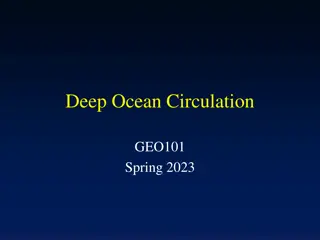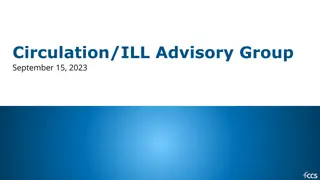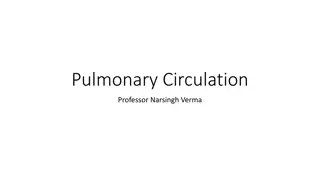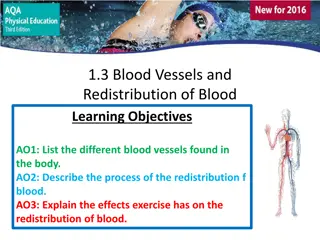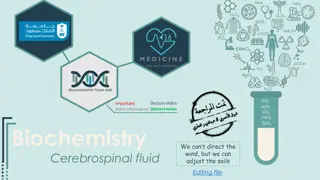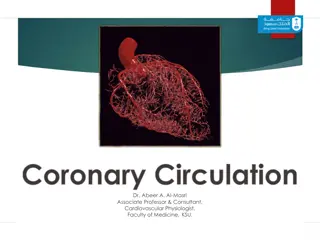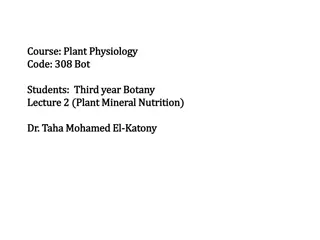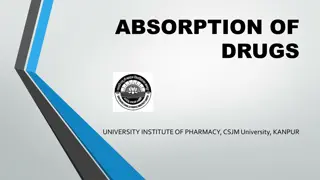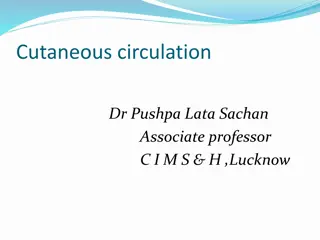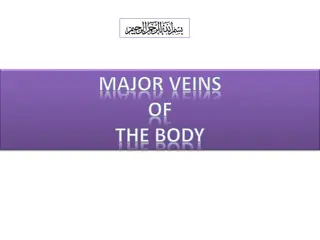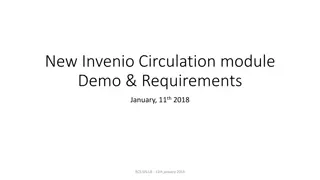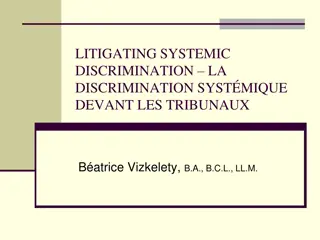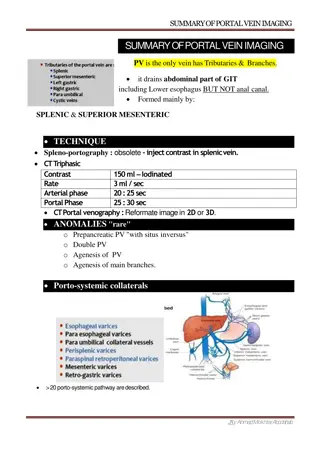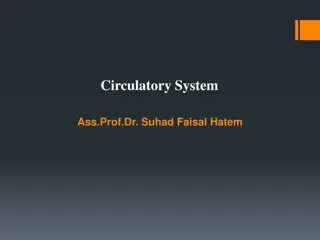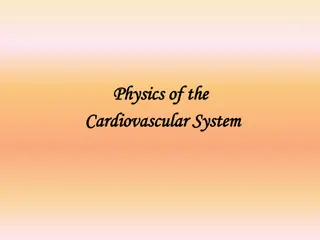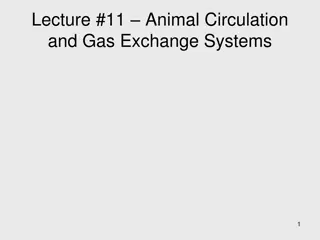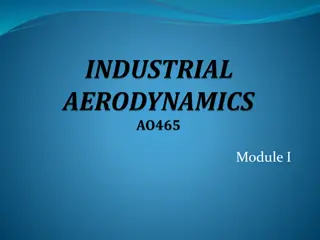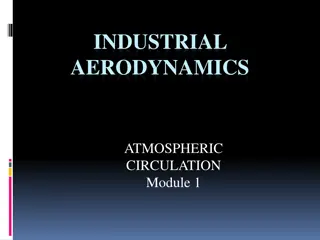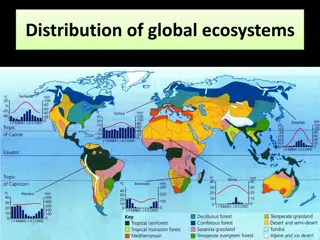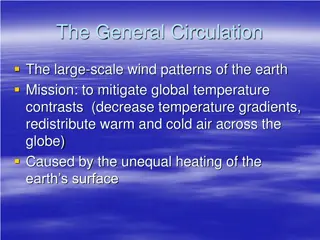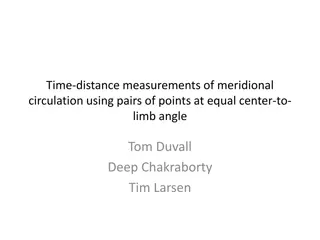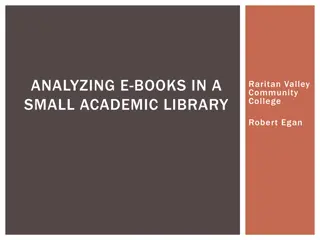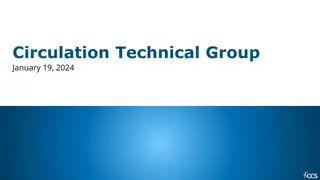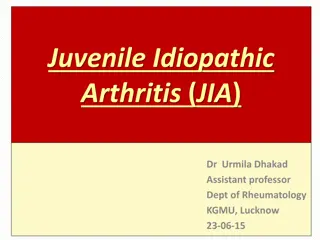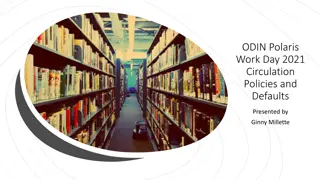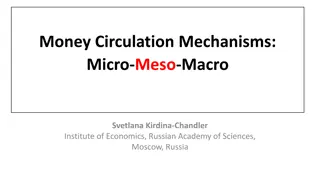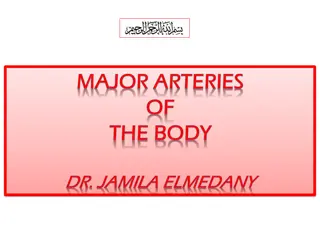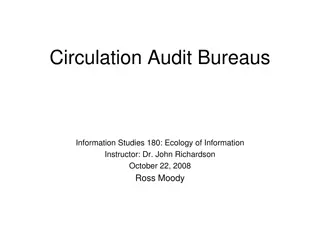EURAXESS Talent Circulation Hub
The EURAXESS Talent Circulation Hub focuses on mobility support for researchers in the ERA, aiming to attract, welcome, integrate, and retain talent. Its structured core coordination group engages with the wider EURAXESS community to enhance services related to international mobility, alumni engagem
4 views • 13 slides
Prevalence of KIT D816V Mutation in Patients with Systemic Mast Cell Activation
This study presents findings from the PROSPECTOR clinical trial on the prevalence of the KIT D816V mutation in the peripheral blood of patients with systemic mast cell activation. The study involves multiple centers globally and sheds light on the significance of this mutation in systemic mastocytos
5 views • 14 slides
Understanding Deep Ocean Circulation and Salinity Patterns
Explore the intricate relationship between ocean salinity, vertical structure, and deep-water currents in this informative collection of images and explanations. Discover how salt inputs and outputs influence ocean salinity levels, and learn about the factors that contribute to the vertical variatio
12 views • 21 slides
Understanding Pulmonary Circulation and V/Q Ratio in Respiratory Physiology
Explore the high-pressure and low-pressure circulations supplying the lungs, the concept of physiological shunt in pulmonary circulation, different lung zones based on blood flow, V/Q ratio and its clinical significance, and abnormal V/Q ratio patterns. Delve into the role of pulmonary circulations
11 views • 28 slides
Circulation/ILL Advisory Group Overview and Manual Item Recovery Discussion
The Circulation/ILL Advisory Group plays a crucial role in consulting with CCS on system changes, conducting research, and recommending policy improvements. Advisory group members are expected to actively participate in meetings, engage in discussions, and collaborate with CCS staff. Additionally, t
0 views • 21 slides
Understanding Pulmonary Circulation and Its Importance in Respiratory Physiology
Pulmonary circulation, as explained by Professor Narsingh Verma, plays a crucial role in the respiratory system, showcasing distinct differences from systemic circulation. The low pressure and resistance in pulmonary circulation allow for optimal gas exchange at the alveolocapillary membrane. Variou
1 views • 30 slides
Understanding Blood Vessels and Circulation in the Body
Explore the intricate network of blood vessels in the body, including arteries, veins, and capillaries. Learn about the process of blood redistribution and the impact of exercise on circulation. Understand the vital role of the circulatory system in maintaining overall health and physical performanc
0 views • 14 slides
Understanding Cerebrospinal Fluid (CSF): Functions, Formation, and Circulation
Cerebrospinal fluid (CSF) plays a vital role in providing a controlled chemical environment, nutrient supply, waste removal, and physical support and protection to the brain and spinal cord. This fluid circulates around the central nervous system, and its formation involves processes like selective
0 views • 23 slides
Understanding Coronary Circulation and Arterial Supply in Cardiovascular Physiology
Explore the intricate details of coronary circulation, including arterial supply, branches of coronary arteries, and areas of distribution. Dr. Abeer Al-Masri, an Associate Professor and Cardiovascular Physiologist at the Faculty of Medicine, KSU, provides valuable insights on the topic, covering th
1 views • 30 slides
Understanding the Cardiovascular System: An In-Depth Exploration
Exploring the intricate workings of the cardiovascular system, this comprehensive guide covers the heart, blood vessels, circulation, and the composition of blood. Learn about the structure and functions of the heart chambers, blood vessels, and the vital role of blood in maintaining circulation. De
2 views • 16 slides
Plant Mineral Nutrition: Absorption and Circulation of Ions in Roots
Plant mineral nutrition involves the absorption and translocation of ions across roots. Salts are absorbed passively and actively, with ions moving into the root's apoplasm via free diffusion. The Casparian strip in endodermal cells acts as a barrier, allowing ions to pass only through the protoplas
0 views • 27 slides
Understanding Drug Absorption Mechanisms in Pharmacy Studies
Drug absorption is a crucial process in pharmacology, involving the movement of drugs from administration sites to systemic circulation. Explore the definitions, bioavailability, routes of administration, and mechanisms like passive diffusion through cell membranes. Gain insights into how drugs disi
0 views • 13 slides
Understanding Cutaneous Circulation and Blood Supply in Different Body Regions
Cutaneous circulation plays a vital role in supplying blood to the skin, with variations in apical and non-apical regions of the body. The blood flow is regulated by neural, thermal, and metabolic factors, and controlled by sympathetic fibers. Sympathetic vasoconstriction and vasodilation affect the
0 views • 19 slides
Understanding Capillary Circulation in the Vascular System
This content delves into the intricate components of capillary circulation, covering topics such as microcirculation, types of capillaries, regulation of flow in capillary beds, and the formation of interstitial fluid. It also discusses edema, lymphatics, diffusion, and filtration processes. The vis
4 views • 28 slides
Overview of Veins and Venous Circulation in the Body
Veins play a crucial role in the circulatory system by carrying deoxygenated blood back to the heart. This lecture covers the general principles of veins, the anatomy of major veins like the superior and inferior vena cavae, tributaries, and their roles in different parts of the body. It also discus
0 views • 14 slides
New Invenio Circulation Module Demo - Requirements and Workflow Proposal
Introduction to the new Invenio Circulation module demo and its requirements for managing books, documents, and acquisitions. Explore the circulation system's user and librarian views, including search capabilities, loan processes, and item management. Key features include integration of holdings in
0 views • 20 slides
Fighting Systemic Discrimination Through Litigation: A Legal Perspective
This content delves into the crucial role of litigation in combatting systemic discrimination, particularly in the context of under-representation of women in male-dominated work environments. It emphasizes the need for multiple strategies, including legal action, to address discriminatory barriers
0 views • 15 slides
Oral Manifestations of Systemic Diseases in Dentistry
This content explores various systemic diseases and their oral manifestations relevant to dentistry. It covers associations between heart disease and periodontal disease, effects of chronic corticosteroid use on the pulmonary system, endocrine disorders like diabetes and thyroid issues, autoimmune d
1 views • 63 slides
Portal Vein Imaging Techniques and Anomalies Overview
Portal vein imaging is crucial for evaluating conditions affecting the abdominal part of the gastrointestinal tract. Techniques such as spleno-portography and CT triphasic contrast imaging are used to visualize the portal vein and diagnose anomalies like portal-systemic collaterals and porto-systemi
4 views • 7 slides
Understanding the Connection Between Oral Health and Systemic Diseases
The relationship between oral health and systemic diseases is significant, with manifestations within the oral cavity providing clues to underlying systemic issues. Disease processes involve aspects like etiology, pathogenesis, morphologic changes, and clinical significance. Organisms and toxins spr
0 views • 19 slides
Understanding the Circulatory System: Functions and Components
The circulatory system, comprised of pulmonary and systemic circulation, plays a crucial role in transporting oxygen, nutrients, and waste products throughout the body. It consists of the heart, arteries, veins, and capillaries which work together to ensure proper circulation. Blood, the carrier of
0 views • 21 slides
Understanding the Cardiovascular System: A Detailed Overview
The cardiovascular system, comprising the heart, blood vessels, and blood, plays a crucial role in supplying fuel and oxygen to the body's cells while removing waste products. This system functions as a double pump, circulating blood through the pulmonary and systemic circulatory systems. Proper val
0 views • 23 slides
Animal Circulation and Gas Exchange Systems Overview
The lecture explores the importance of circulation and gas exchange systems in animals, covering topics such as the evolution of double circulation, blood structure and function, respiratory pigments, and the necessity of oxygen acquisition and carbon dioxide release in diverse animal species. It al
0 views • 127 slides
Analyzing Systemic Climate Risk in the Financial Sector
This study discusses systemic climate risk in the financial sector by examining the effects of climate risks on financial institutions. It aims to design a market-based framework to assess the vulnerability of financial institutions to climate risks and analyze potential contagion effects. The frame
0 views • 39 slides
Understanding Atmospheric Circulation and Wind Patterns
Learn about atmospheric circulation, local winds, terrain types, mean velocity profiles, and different types of winds such as prevailing winds, periodic winds, and local winds. Explore the concept of planetary winds like Trade Winds and Westerly Winds, and understand how winds create air currents. D
0 views • 22 slides
Understanding Atmospheric Circulation on Earth
An atmospheric circulation driven by temperature differences between the equator and poles influences global weather patterns. The sun's changing angle throughout the year results in various pressure areas and the formation of large circulation cells. The main effects include the transport of humidi
0 views • 11 slides
Understanding Large-Scale Winds and Atmospheric Circulation
Large-scale prevailing winds, such as the Hadley Cell, vary by latitude. These winds drive global atmospheric circulation, with rising air at the equator, sinking air at 30 degrees, and trade winds in between. By studying wind patterns, we gain insights into climate systems and weather phenomena.
0 views • 13 slides
Understanding Global Ecosystems and Climate Influences
Global ecosystems are defined by dominant vegetation types and are influenced by factors like climate, atmospheric circulation, altitude, relief, and ocean currents. The distribution and characteristics of ecosystems are shaped by global atmospheric circulation patterns, creating distinct belts of v
0 views • 18 slides
Understanding the General Circulation of Earth's Atmosphere
The general circulation of the Earth's atmosphere plays a crucial role in mitigating global temperature contrasts by redistributing warm and cold air. This system includes the Polar Cell at high latitudes, the Hadley Cell in the tropics, trade winds, oceanic heat distribution through Eckman Transpor
0 views • 13 slides
Measurement Technique for Meridional Circulation in Solar Activity
In this research, time-distance measurements were conducted to study meridional circulation in solar activity. The east-west signal was found to be similar to the north-south signal, prompting analysis steps involving spherical harmonics computation, image reconstruction, filtering, cross-correlatio
0 views • 7 slides
European Framework for Research Careers and Skills Taxonomies
The European Framework for Research Careers aims to synergize with the European Education Area and employment policies, recognizing and enhancing talent in research. It emphasizes brain circulation, intersectoral mobility, and training development. The initiative includes developing a Competence Fra
0 views • 9 slides
Analyzing E-Book Collection and Circulation Trends at Evelyn S. Field Library, Raritan Valley Community College
The Evelyn S. Field Library at Raritan Valley Community College boasts a diverse collection of e-books, including titles from Springer, Safari, EbscoEbooks, and ebrary. With a significant number of student headcount and volumes in print, the library's e-book circulation has shown steady growth over
0 views • 6 slides
Empowering Change: The Systemic Approach to Addressing Social Injustice
Explore the systemic change approach to combating unjust structures that oppress individuals living in poverty. Delve into understanding systems as interconnected wholes and the significance of systemic thinking in driving transformation. Uncover the complexities of social systems and the need to ac
0 views • 20 slides
CCS Updates: Polaris Upgrade & Circulation Distribution Emails
Latest CCS updates include the scheduled upgrade of Polaris to version 7.5, enhancements to the distribution emails for circulation, a new functionality for damaged circulation status, and more. Staff are advised to check patron records for in-house use and utilize the Leap Find Tool for efficient s
0 views • 16 slides
Understanding Juvenile Idiopathic Arthritis (JIA) and Systemic Onset JIA (SOJIA)
Juvenile Idiopathic Arthritis (JIA) is arthritis of unknown origin that starts before the 16th birthday and lasts at least 6 weeks. It was previously known as juvenile rheumatoid arthritis (JRA). The diagnosis of JIA requires meeting specific criteria, and it can be classified into various subtypes
0 views • 52 slides
ODIN Polaris Work Day 2021 Circulation Policies Overview
Explore the comprehensive circulation policies and defaults presented by Ginny Millette during ODIN Polaris Work Day 2021. Learn about login procedures, troubleshooting tips, patron block descriptions, loan limits, fee policies, and more.
0 views • 19 slides
Analysis of EAST Retention Impact on Interlibrary Loan Transactions
Analyzing the impact of retention commitments on Interlibrary Loan (ILL) transactions, this study delves into the circulation patterns of retained items, digital surrogates utilization, and speed of delivery considerations. Key findings include a significant proportion of transactions with retention
0 views • 11 slides
Exploration of Money Circulation Mechanisms in Economic Theory
Money circulation mechanisms are scrutinized in this study, revealing the complexities beyond orthodox economic approaches. The analysis spans micro, meso, and macro levels, highlighting the inadequacies in traditional models and proposing a more holistic perspective. Insights from heterodox traditi
0 views • 24 slides
Understanding Arteries: Anatomy and Function Overview
Explore the key concepts related to arteries, including their definition, anastomosis, end arteries, aorta divisions, and major artery distribution in the body. Learn about the general principles of arteries and their role in blood circulation, emphasizing the importance of anastomoses. Dive into th
0 views • 21 slides
Evolution of Circulation Audit Bureaus and Verification Process in Media Industry
Circulation Audit Bureaus are industry-sponsored organizations that verify and report publication circulations. The history dates back to the late 1800s when they were established to address inflated circulation figures. The verification process involves audits and adherence to standards set by the
0 views • 50 slides


